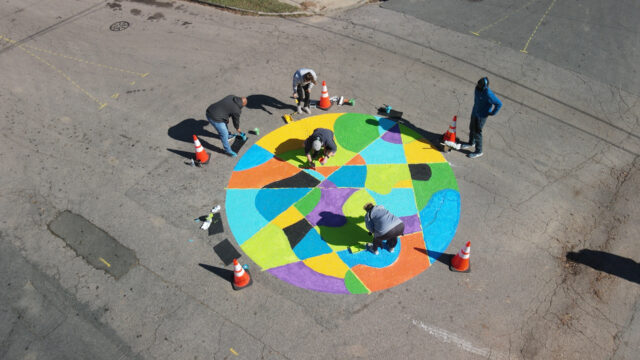 10 NACTO Member Cities Selected to Receive $50,000 for Projects with Community-Based Organizations
10 NACTO Member Cities Selected to Receive $50,000 for Projects with Community-Based Organizations
The National Association of City Transportation Officials (NACTO), in partnership with Bloomberg Philanthropies, today announced the winners of Streets for Pandemic Response and Recovery grants, which provide short-term funding and technical assistance to cities to help them adapt streets in service of communities disproportionately impacted by COVID-19.
Selected cities will receive $50,000 to work with local community partners to transform streets into community assets that aid in pandemic recovery. The grant program is a continuation of NACTO’s Streets for Pandemic Response and Recovery initiative which documented the quick-build design strategies–from bike and bus lanes, to slow streets, and outdoor dining–implemented by cities around the world.
“Strong communities create strong streets,” said Janette Sadik-Khan, NACTO Chair and Principal with Bloomberg Associates. “Bringing local voices and creativity to local projects helps build trust as put more accessible, resilient and equitable streets on the map.”
“Who knows a place better than the people who live there?” said Corinne Kisner, Executive Director of NACTO. “This round of grant projects leans into the deep knowledge of community members–and the technical know-how of city staff–to deliver targeted improvements to neighborhood streets. Whether slowing down neighborhood traffic or speeding up economic recovery for local businesses, we can’t wait to see what ingenuity and impact the next round of city-community organization partnerships have.”
“Streets for Pandemic Response and Recovery enabled us to take a step back when planning shared streets in East Durham and tap into community expertise to define our shared goals and the most effective ways to achieve them,” said Sean Egan, Director of the Durham Department of Transportation, a 2020 grant recipient. “With the resources from the program, we were able to design a slow streets program that reflected the community’s safety priorities. What started as a shared streets program morphed into a traffic calming project, showing us that cities work best when they work with local partners.”
“We’re laying a foundation for lasting, community-driven change and supporting economic recovery in Denver, and we’re doing it by building partnerships and trust,” said Eulois Cleckley, former Executive Director of Denver’s Department of Transportation & Infrastructure, a 2020 grant recipient. “The Streets for Pandemic Response & Recovery grant supported Denver’s work to increase participation in the city’s outdoor street patio program in two equity neighborhoods, leading to a greater understanding of the challenges businesses face during this time and identify ways to address them appropriately. This effort will help with sparking an equitable recovery in American cities of all sizes.”
The selected projects for 2021 Streets for Pandemic Response and Recovery Grants include:
- Baltimore, MD: Creating safer access to parks for people walking and biking by calming traffic and adding art to the street.
- Denver, CO: Building “Jazz Alley”, repurposing a street in Denver’s Five Point community to provide outdoor space for local immigrant-owned businesses.
- Fort Collins, CO: Providing support for historically marginalized and underrepresented communities to participate in the city’s new asphalt art program.
- Los Angeles, CA: Creating safer drop-off/pick-up zones for students walking and biking to school in two communities deeply impacted by the pandemic.
- Madison, WI: Removing barriers for local street vendors to operate in city parks.
- Minneapolis, MN: Developing an engagement and implementation plan for traffic calming projects that center the Native American community along 18th Ave in Minneapolis.
- Portland, OR: Transforming a parking lot in East Portland into a summer food market.
- San Francisco, CA: Enhancing an existing project along Turk Street in the Tenderloin to provide programming and resources for unhoused residents and improve pedestrian safety and walking space.
- Seattle, WA: Extending and programming an open street in the Lake City neighborhood to increase space for outdoor recreation and address community concerns about lack of safety.
- Washington, DC: Revitalizing the Columbia Heights Civic Plaza, which has been a critical gathering place for unhoused community members disproportionately at-risk during the pandemic.
Awardees and community partners will receive funding, technical assistance, and access to a peer network of cities and consultants to help with project scoping, planning, and execution over six months. Learn more about the program and selected projects at nacto.org/sfprr-grants.
###
About the National Association of City Transportation Officials (NACTO)
NACTO is an association of 89 major North American cities and transit agencies formed to exchange transportation ideas, insights, and practices and cooperatively approach national transportation issues. The organization’s mission is to build cities as places for people, with safe, sustainable, accessible, and equitable transportation choices that support a strong economy and vibrant quality of life. To learn more, visit nacto.org or follow us on Twitter at @NACTO.
About Bloomberg Philanthropies
Bloomberg Philanthropies invests in 810 cities and 170 countries around the world to ensure better, longer lives for the greatest number of people. The organization focuses on five key areas for creating lasting change: the Arts, Education, Environment, Government Innovation, and Public Health. Bloomberg Philanthropies encompasses all of Michael R. Bloomberg’s giving, including his foundation, corporate, and personal philanthropy as well as Bloomberg Associates, a pro bono consultancy that works in cities around the world. In 2020, Bloomberg Philanthropies distributed $1.6 billion. For more information, please visit bloomberg.org or follow us on Facebook, Instagram, YouTube, Twitter, and TikTok.
Press Contact
Alex Engel | alex (at) nacto.org